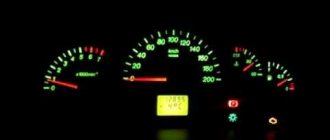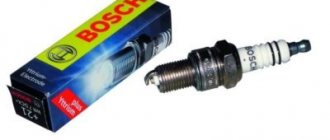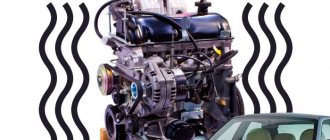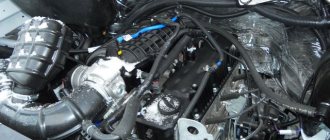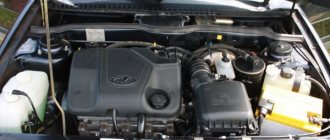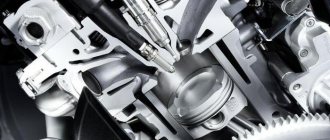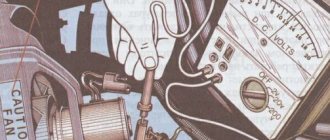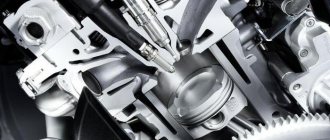The last few days I have been busy fixing engine problems that arose after a long-distance trip of about 1200 km to Moscow.
The symptoms of the malfunction were as follows:
— The malfunction clearly manifested itself while stopping at a traffic light. — The car began to jerk while driving, very strong jerks. — The Check Engine light came on and while driving it began to flash. — The engine idle speed floated between 700 and 500. — The car body began to vibrate very strongly at idle and at low speeds during acceleration. — The traction disappeared and the car began to pick up speed very slowly when accelerating. — When you press the gas pedal, the engine speed quickly rises, but there is no acceleration. — At high speeds and speeds above 80 km/h, the malfunction ceased to manifest itself clearly, but there could be a powerful short-term unexpected jerk. — When reverse gear is engaged, there are significant jerks when driving. — Engine troubles during operation. — There was additional noise from the exhaust pipe (a loud clicking sound). — Gasoline consumption has increased from 8.3 to 11 liters according to the on-board computer.
What's the first thing that comes to mind?
— Problems with oil. — Problems with candles. — Clogged injectors.
What did you do right away?
— Checked the oil. The oil was at a minimum, but not critical. Topped up in the wind and frost. — I ordered spark plugs via Wi-Fi and replaced them immediately. It got better, but the problems did not disappear. — I thought about cleaning the injectors, but decided to replace them.
I ordered a new set of injectors, but I was not sure that replacing the injectors would go away the problems. While the injectors come with Exists, I need to somehow drive, and I began to study further on the Internet.
Symptoms on all forums indicate a malfunction of the following components: - Spark plugs. - Coils. - Injectors. - High voltage wires. — Engine mountings (vibration). - Catalyst.
I was ready to replace everything except the catalyst, because a new one costs about 68,000 rubles, and they usually don’t change it, but install a flame arrester for significantly less money, something like 12,000 rubles.
What interested me most about my malfunction was the drop in engine power with jerks and the vibration in the body, which was a consequence of these jerks.
It turned out that the blinking Check Engine and the “triple” of the engine indicate that one of the engine cylinders is not working due to a “misfire”. I don’t have an ODB II cord, and therefore there is no way to read the error code, and engine diagnostics with this cord from the officials costs the same as the ODB II cord itself with software for connecting to a computer (1200 rubles).
It seemed to me that the engine might be “troubling” because the injector for injecting air mixtures is not working or the coil with the spark plug simply does not ignite it. When I saw on numerous forums a description of the obvious symptoms of “Loss of engine thrust” with a faulty coil “Dielectric breakdown”, it immediately became clear that most likely life was being poisoned by a broken coil. Plus, I looked again at the photo of my old spark plugs from the article about replacing engine spark plugs. It turned out that three spark plugs are dry, and one has a slightly damp inner insulator, and there are many oil spots on the outer ceramic insulator. Oil spots on the outer insulator of the spark plug indicate that the spark is hitting anywhere, and the efficiency of igniting the fuel mixture in a given cylinder is reduced. I am attaching a photo of the old candles again.
As a result, it turns out that on some cylinder the spark plug simply does not work correctly and because of this there are misfires and all other symptoms.
In the morning I pulled out all the coils and examined them again. It turned out that the second coil was very badly punctured and charred in the area of the rubber tip. As a temporary solution, you could wrap the breakdown with fum tape or heat shrink to fix the problem in order to get there normally or wait until a new coil arrives. A solution with fum tape and heat shrink will not be enough for a long time, and it is better not to do it yourself, but to replace the coil with a new one, because this element is considered not suitable for repair.
What is engine tripping?
First, let's look at the definition of this concept. This term appeared due to the 4-cylinder engine design, where if one of the cylinders failed, only three working pistons remained. However, tripling does not only apply to internal combustion engines with four cylinders. Now this concept is applied to all internal combustion engines - six-cylinder and even twelve-cylinder.
How to fix the problem of the checkbox burning on a VAZ 2114?
The best option would be to identify or eliminate the cause of the lighted check at a service station. But almost every car owner can fix it on his own without resorting to the help of professionals.
Add or completely change the oil
It is imperative to remember that under no circumstances should the oil level be measured immediately after turning off the internal combustion engine. When determining the cause in the ECU, you will initially have to reset the old settings to factory settings. If this measure is not effective, you will have to change the software. In order to perform this procedure correctly, you definitely need skills and the ability to understand auto electricians. To do this, you need to have special equipment on hand, such as a laptop, K-line cable and software.
Poor quality gasoline
If, as a result of the diagnosis, it is revealed that low-quality gasoline is to blame and therefore the check for the VAZ 2114 lights up, then it must be completely drained. And subsequently, the remaining fuel must be completely removed from the system. This is currently the most known problem. But it is quite difficult to determine that it is the fuel that is the problem.
Malfunctions in the ignition system
First, you need to assess the condition of the gaps between the electrodes of the spark plugs; it should not be more than 1.3 millimeters. But if the spark plugs have not been changed for a long time, they should be changed first. Next, you can ring the explosive wires and if a problem is detected, they also need to be replaced. Then you need to check the coil for sparks. And using a multimeter, measure the contact of its windings.
Oxygen sensor failure
Firstly, a clear sign of such a malfunction is increased fuel consumption by the vehicle. In such a situation, the best option is to replace the old oxygen sensor.
Problems with the catalyst
They usually appear due to the systematic use of leaded fuel. If it turns out that they are damaged, then they certainly need to be replaced with a new device.
Major malfunctions in the fuel system of a vehicle, which in turn trigger a check directly on the vehicle panel.
You can neutralize it without much effort and resort to washing the injectors. In addition to all this, it is imperative to check the pressure level in the fuel rail.
The most suitable indicator should certainly produce at least three atmospheres. If, as a result, the pressure does not reach the required values of three atmospheres, then in such a situation it is worthwhile to immediately completely wash the filters. If such manipulation does not give a positive result, then in the end you will have to completely replace the car fuel pump.
If the vehicle owner had previously installed LPG in such a situation, when the check light comes on, the car will certainly need to be subjected to additional diagnostics. Indeed, in addition to the main reasons, a possible source of failure can most likely be a gearbox or a sharp decrease in pressure in the fuel supply system.
Sources
- https://avto-forum.name/threads/zagoraetsja-chek-i-mashina-ne-tjanet-chto-delat-v-dannoj-situacii.3652/
- https://moysolaris.ru/zagorelsya-chek-dvigatelya/
- https://cartechnic.ru/articles/kakie_neispravnosti_pokazyvaet_migajuschij_check_engine_dvigatelja
- https://autorambler.ru/advice/zagorelsya-chek-neispravnosti-dvigatelya-prichiny-i-chto-delat.htm
- https://ladaautos.ru/vaz-2114/remont-avto-esli-migaet-chek-i-troit-dvigatel-vaz-2114.html
- https://auto-pos.ru/115-zagoraetsya-chek-neispravnostej-dvigatelya-i-mashinu-ne-tyanet.html
- https://labuda.blog/203734
- https://moyidorogi.ru/pochemu-morgaet-chek-i-troit-dvigatel/
- https://legionerov.ru/avtomobili/pochemu-morgaet-chek-i-troit-dvigatel-vaz-2114/
- https://provaz2114.ru/elektrika/gorit-chek-na-vaz-2114-prichiny.html
Signs
How do you know if the engine is leaking? With such a malfunction, the check engine light does not always flash. Therefore, it is important to know third-party signs that may indicate a problem:
- Increased engine vibration. It is significantly noticeable at low and idle speeds.
- Spark plug color change. After removal, its head will be dark. Since the mixture does not ignite, the candle becomes covered with soot and soot.
- Increased fuel consumption. This sign is related to the previous one. Since the mixture does not ignite, it simply goes into the exhaust pipe.
- Loss of engine power. Since the engine runs on three cylinders, it does not have enough energy to produce the required torque.
- Exhaust sound. He will be unstable.
- The appearance of black or thick white smoke from the exhaust pipe.
- Intermittent jolts during acceleration and even motion. This symptom also indicates a misfire. This error is often related to the ignition system.
It is worth listening carefully to the nature of the engine. If the friction increases at medium and high speeds, it can be assumed that the valves in the engine are not working properly. One simple reason is increased valve clearance.
In any case, if one or more of the above symptoms are detected, it is worth taking corrective action.
Is it possible to continue driving if the “Check Angie” light comes on?
The first thing you should do when this indicator lights up is to stop and listen to the car. There are times when the problem goes away on its own. Still, we don’t have the most unique electronics. If the problem remains, you need to find the nearest service station and try to solve it.
When going to a service station, you should follow certain rules:
- the vehicle's driving mode must be gentle;
- try not to increase the speed level to the maximum;
- turn off all electronic frills in the form of air conditioning, radio, DVR and any equipment that is in the car at this time (multimedia systems also apply to them);
- minimize the number of sudden braking, extreme driving in this case is not encouraged;
- movement of vehicles at night with this disadvantage is not recommended;
- If you are caught in trouble while traveling in the evening, the best way out of the situation is to take certain precautions.
Remember that ignoring these rules can lead to engine malfunction, which can result in jamming or fire.
Reasons for tripling
If the “check” is flashing on a VAZ car and the engine is shaking, this may indicate the following problems:
- Presence of air leaks in the brake system (possible problems with the vacuum booster).
- Failures in adjusting the ignition timing.
- Faulty spark plugs.
- Violation of the integrity of the high-voltage wire.
- Ignition coil malfunction.
- The air filter is clogged (the engine simply does not have enough oxygen).
- Violation of carburetor adjustments (applies to older cars).
- Failures in adjusting the gas distribution mechanism.
Among the more serious problems that cause the “check” to flash and the engine to stall, we can highlight:
- Worn intake or exhaust valve. This could be a burnout or mechanical deformation of the plate.
- Intake manifold leakage.
- Wear of valve stem seals (in this case, the engine consumes about one liter of oil per thousand kilometers).
Tips for restoring the performance of the power plant
If cleaning the engine compartment results in the engine being unable to start, the car owner should not panic and immediately call a tow truck. You can correct the situation right on the spot. It is enough to dry the places where liquid accumulates. It is recommended to adhere to the following instructions:
- Open the hood and visually inspect the power plant and other components. Any water found must be carefully removed;
- Remove the terminals from the battery and remove oxides;
- Wipe the high-voltage wires along the entire length;
- Unscrew the spark plugs and let them dry. Make sure there is no water in their planting areas;
- If there is a distributor, it must be dismantled. After this, remove the lid and wipe everything dry;
- Open the air filter housing and make sure there is no liquid in it;
- Check the status of the alarm.
If the above steps did not help, then the malfunction did not arise as a result of the engine being washed, but for other reasons. In this case, it is necessary to begin troubleshooting components and parts. For example, a cracked distributor cap could perform its functions when dry, but the appearance of moisture completely rendered it inoperable.
Determining the faulty cylinder
Which cylinder causes the “check” to blink and the engine to stall? Diagnostics will show the result. You can perform this operation yourself:
- Disconnect the armor wire tips from each spark plug one by one. It is advisable to do this with rubber gloves to prevent electric shock.
- Record how much the nature of the engine’s operation has changed. If the engine runs even harder, the cylinder is good. If, after removing the wire, the engine operates as before, then this cylinder is faulty.
Please note that when disconnecting the wire, you do not need to grasp the cap. You should grab the wire, but carefully. Do not pull it by force, otherwise the wire may be damaged.
Another way to check is computer diagnostics. In this case, we connect the diagnostic equipment to the ODB II connector and turn on the ignition. Then the computer will read all errors. If this is a Toyota car, then misfire in the third cylinder will be indicated by error p0303.
The nuances of reading error codes on a car
Cars of different brands have different engine management system structures. The ECU unit can be located in different places and have different options for connecting diagnostic equipment. Also, the system may well not be the most accurate and give general error codes, leaving the owner in confusion. However, this applies to inexpensive cars that have primitive ECU units and fairly simple diagnostic equipment. There are a few things to keep in mind when reading error codes and diagnosing your car.
Here are the main nuances of this procedure:
- portable diagnostic modules do not provide accurate information and do not allow you to look deep into the firmware to see the necessary features of the engine and electronics;
- high-quality diagnostics at the service solves the problem and will help you see why the diagnostic lamp lights up in your car during warm-up, this is important for further repairs;
- in some cars, the ECU does not remember errors and does not record them; you can only see them if the Check light comes on on your car at that particular moment;
- An error generated during diagnostics does not always indicate problems with a specific component; very often we will be talking about wiring, breaks, loss of contact on twists and solders;
- When performing repair work, it is important to periodically carry out diagnostics and make sure that the problem is eliminated; this is an important point for the further operation of the machine.
If you have a more or less modern on-board diagnostic system, then after connecting the computer you can see quite a lot of information about the real state of the car. But budget vehicles are equipped with simple ECUs that do not save or record anything, and the errors are often very approximate. So there is no need to rely on diagnostic data. The error code may indicate one sensor, and the culprit of the problem will be a completely different electronic unit.
How to check spark plugs?
For this we need a special spark plug wrench. All work is performed on a cooled engine. On many cars, access to spark plugs is unlimited. But on some models (for example, Nissan Qashqai), for this you first need to remove not only the decorative cover, but also the plastic intake manifold, as well as the throttle valve. When dismantling these units, you should stock up on new gaskets.
Having taken out the candle, it is worth inspecting its condition. It should not have any plaque. You also need to check the gap with a special feeler gauge. It is different for each car, but often amounts to 0.8 millimeters.
If the gap is too large, a spark simply cannot form, which is why the “check” blinks and the engine stalls. If there is a large gap on the spark plug, this can be easily fixed. To do this, just bend the electrode slightly, and then check the distance with the same probe. If the candle has carbon deposits, it can be cleaned. You can also replace it with a new one. In this case, we will know exactly what the problem is - in the candles or in something else.
High voltage wires
What should you do if, after replacing the spark plug, the “check” flashes and the engine starts again? In such a situation, it can be assumed that the reason lies in the high-voltage wire. It can be checked in two ways:
- Visually. We take out our wire and look at its integrity. The high-voltage element must not contain cracks, cuts or abrasions. Any of these symptoms can provoke a breakdown of the wire, due to which the coil will not be able to transmit a spark even to a known-good spark plug. You can also check the wire in another way. In the dark you need to watch its work. If “crickets” are visible, this indicates that there is a severe breakdown of the insulation.
- Using a multimeter. This is a more accurate way of diagnosis. To measure the resistance of a high-voltage wire, the multimeter is switched to ohmmeter mode. Then, using probes, you need to touch both sides of the wire. Next, the device will display information. The resistance of high-voltage wires should be no more than 10 kOhm. If the indicator is higher than normal, this indicates the presence of a breakdown.
Ideally, high-voltage wires should be replaced as a set.
Checking the oil level and condition
The next most important reasons for the signal are considered to be overheating of the motor and a decrease in the level of lubricating fluid in the internal combustion engine. It is recommended to check the engine temperature. If there is no overheating, you need to check the volume and condition of the oil. After checking the level, it is necessary to add the missing amount of lubricant. Using a clean paper napkin, the quality and composition of the engine oil is checked according to the following criteria:
- Color.
- Consistency.
- Presence of mechanical inclusions.
- The smell of burning.
If everything is in order with the quality and quantity of oil, the engine starts to eliminate unusual sounds and noise when operating both at idle and under load.
If unusual noise effects of a running engine are detected against the background of a burning check, it is recommended to send the car to the nearest service company. Moving the car yourself is not recommended; delivery is carried out by towing or other convenient method. Further operation can lead to serious damage and costly repairs to the elements of the power unit.
Problems with fuel and other systems
The “check” can also light up due to a malfunction of the fuel system. The engine will also stall. A common situation is an insufficient amount of fuel supplied to the cylinder. This may indicate contamination of the injectors. But tripling also occurs for other reasons. This:
- Dirty fuel filter.
- Problems with the fuel pump.
- Faulty air flow sensor.
- Worn throttle valve.
It is recommended to check the compression level. If at the same time the cylinder has low compression (it differs from neighboring cylinders by 2 or more units), this may indicate serious mechanical malfunctions, such as:
- Piston burnout.
- Wear of piston rings.
In this situation, it will no longer be possible to fix the breakdown yourself. Requires engine disassembly and complex repairs.
Troubleshooting Methods
Now that the main reasons have been identified - why the Check caught fire, you can move directly to methods for solving the issue. Of course, it is best to contact a car service to solve the problem, but many motorists, due to expensive repairs, try to solve the problem themselves.
So, before you start looking for a problem, you should connect to the electronic engine control unit and conduct a comprehensive diagnosis of all systems. To do this, you will need a laptop computer, a cable for connecting to the OBD 2 car and software that is suitable for this electronic control unit.
If the car is equipped with HBO
Very often, cars with gas equipment have a similar problem. Why does the engine stall and the check engine light flash? There are several reasons for this:
- Clogged gas filter. No matter what generation the gas equipment is, it must have a gas filter. This is a small element that is usually installed next to the evaporator reducer. On average, the filter resource is 20-30 thousand kilometers. But if you refuel with low-quality fuel, this deadline may come earlier. As a rule, the filter becomes clogged with graphite shavings, which prevent the gas from passing further through the membranes of the reducer. You can replace the cleaning element yourself. To do this, you must first turn off the valve on the tank, start the engine and exhaust the remaining gas from the line. Then unscrew the cap with a hexagon and replace the filter. It is also worth installing a new gasket. Upon completion of work, do not forget to unscrew the gas supply valve on the fuel tank again. At first, the engine will be difficult to start, but then its operation will stabilize (since the fuel needs time to get into the gearbox).
- Malfunction of gas injectors. The problem is relevant for fourth generation HBO. At the same time, gas consumption increases, detonation and tripling appear. How to fix this problem? As a rule, the problem is resolved by flushing and calibrating the injectors. However, unlike the previous case, it will be difficult to do this work yourself. Here it is better to seek help from specialists.
Other problems may be related to the ignition system, but these malfunctions are no different from simple gasoline cars without LPG. If the engine troubles due to wires or spark plugs, you need to act in the same way as described above.
Catalyst
If the car's mileage is less than 100 thousand kilometers, most likely it still has a catalyst. By this time, it may already become clogged and not perform its direct function. Inside the catalyst there are small honeycombs on which carbon deposits accumulate over time. As a result, the gases cannot leave the combustion chamber normally, and the engine “suffocates.”
What is the solution to this problem? It's simple: instead of a standard catalyst, a flame arrester or just a straight pipe is installed. Another, most cost-effective solution is to remove the ceramic core of the catalyst mechanically. Access is provided after opening the case with a grinder, after which the hole is welded. This will not harm the engine. The maximum that will change is the smell of exhaust gases and their toxicity. But since we do not yet control any environmental standards, owners of used VAZs and foreign cars are completely getting rid of catalysts. The cost of a new element is more than 20 thousand rubles, and they are almost out of stock.
Oxygen sensor
Now all cars are equipped with catalysts. For proper operation of the catalyst, a lambda probe is required. This is a special sensor that reads the remaining oxygen, based on the data of which the mixture and ignition are adjusted.
If the lambda probe is faulty, the car may consume more fuel than it should. Also, at the same time, a “check” lights up on the panel. However, the engine may not be tripping. How to solve this problem? Since the new catalyst is very expensive, many simply knock out its “filling” and install a fake instead of an oxygen sensor. This way the ECU will consider that the system is working correctly, and the “check” will no longer light up on the panel.
Let's sum it up
So, we looked at why the “check” on a car blinks and at the same time the engine stalls. The most common causes of breakdowns are a faulty spark plug or a breakdown of the high-voltage wire winding. You can check this yourself, even without diagnostic equipment (although, to save time, it is better to use it and just read the error codes). Anyone can replace a spark plug or wire. You don't need any special tools for this. However, if the “check” is on due to burnout of the valves or wear of the rings, as indicated by a compression test, only a professional mechanic can help in this situation.
What kind of light bulb is this and how does it threaten the car enthusiast?
Check Engine, or “Check Engine”, literally translated means that the engine should be checked. It is located on the main panel, and the slightest glow of the light bulb signals the driver about problems with the power unit. The main function of modern “Checks” is to control engine speed. They have to do with fuel supply, fuel consumption, ignition, etc. If you do not have some knowledge in the field of auto repair, it will be very difficult to figure out why the “Check” light comes on.
